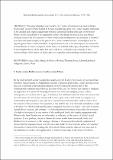Files in this item
The interpretation of Locke's Two Treatises in Britain, 1778-1956
Item metadata
| dc.contributor.author | Harris, James Anthony | |
| dc.date.accessioned | 2021-05-06T23:49:20Z | |
| dc.date.available | 2021-05-06T23:49:20Z | |
| dc.date.issued | 2020 | |
| dc.identifier | 261092631 | |
| dc.identifier | 0204693b-4924-4132-bf4a-ab13931ac431 | |
| dc.identifier | 85074967191 | |
| dc.identifier | 000495003000001 | |
| dc.identifier.citation | Harris , J A 2020 , ' The interpretation of Locke's Two Treatises in Britain, 1778-1956 ' , British Journal for the History of Philosophy , vol. 28 , no. 3 , pp. 483-500 . https://doi.org/10.1080/09608788.2019.1677215 | en |
| dc.identifier.issn | 0960-8788 | |
| dc.identifier.other | ORCID: /0000-0002-0333-3754/work/69029202 | |
| dc.identifier.uri | https://hdl.handle.net/10023/23128 | |
| dc.description.abstract | This paper describes how Locke's Two Treatises of Government was read in Britain from Josiah Tucker to Peter Laslett. It focuses in particular upon how Locke's readers responded to his detailed and lengthy engagement with the patriarchalist political thought of Sir Robert Filmer. In the second half of the eighteenth century, the debate between Locke and Filmer continued to provide the framework within which political obligation was discussed. A hundred years later that had changed, to the point where Locke's readers found it unintelligible that he argued against Filmer and not Hobbes. I explain this in terms of the development in nineteenth century Britain of a new conception of the history of political philosophy, the product of interest in the Hegelian theory of the state. The story told here is offered as one example of how understandings of the history of philosophy are shaped by understandings of philosophy itself. | |
| dc.format.extent | 206686 | |
| dc.language.iso | eng | |
| dc.relation.ispartof | British Journal for the History of Philosophy | en |
| dc.subject | Locke, John | en |
| dc.subject | Filmer, Sir Robert | en |
| dc.subject | Hobbes, Thomas | en |
| dc.subject | Burke, Edmund | en |
| dc.subject | Political obligation | en |
| dc.subject | Laslett, Peter | en |
| dc.subject | B Philosophy (General) | en |
| dc.subject | T-NDAS | en |
| dc.subject.lcc | B1 | en |
| dc.title | The interpretation of Locke's Two Treatises in Britain, 1778-1956 | en |
| dc.type | Journal article | en |
| dc.contributor.institution | University of St Andrews. Philosophy | en |
| dc.contributor.institution | University of St Andrews. Institute of Legal and Constitutional Research | en |
| dc.contributor.institution | University of St Andrews. Centre for Global Law and Governance | en |
| dc.identifier.doi | 10.1080/09608788.2019.1677215 | |
| dc.description.status | Peer reviewed | en |
| dc.date.embargoedUntil | 2021-05-07 |
This item appears in the following Collection(s)
Items in the St Andrews Research Repository are protected by copyright, with all rights reserved, unless otherwise indicated.

